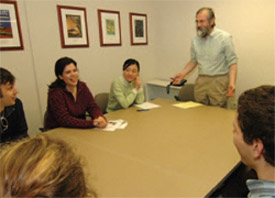

A publication of The Graduate School, University of North Carolina at Chapel Hill
On-Line Version Spring 2006
Home | Back issues | About us | The Graduate School | UNC-Chapel Hill | Make a gift
Outside the Box
Professor develops scientists, encourages new perspectives
 |
| Physics professor Hugon Karwowski serves as a formal mentor to his physics students and as an informal mentor to the Scholars for Tomorrow seminar (above). |
Physics
professor Hugon Karwowski thinks he has the best of both worlds, serving
as a formal mentor and adviser to his physics graduate students while
reaching beyond his own academic discipline as adviser to the Scholars
for Tomorrow Computational Sciences fellows.
Through these dual roles, Karwowski pursues his passion for developing talented students into capable researchers.
“It’s a very pleasant thing for me to see students who were timid and not sure of themselves, and three years later they are intellectually curious and well rounded and very professional young scientists,” he said.
Karwowski, who is also director of graduate studies in the physics and astronomy department, conducts research in nuclear spectroscopy, few-body physics and neutrino physics through his position at Carolina and at the Triangle Universities Nuclear Laboratory.
Though Karwowski’s goal for both his own advisees and the Scholars for Tomorrow students is the same — to help them develop into top-notch scientists — each of these roles requires a somewhat different approach.
With his physics students, Karwowski takes responsibility for their progress as scientists but lets them find their own paths.
“I am trying to train them as independent researchers, so I try to leave them as much freedom as possible,” he explained. “I give general direction and make sure they are being trained, but I don’t tell them what to do. They will not have hands to hold once they graduate.”
This approach is complemented by Karwowski’s relaxed demeanor and the personal attention he gives students.
“He works hard to tailor projects to fit the personal goals of the graduate student,” said Melissa Boswell, Karwowski’s senior doctoral student. “He is very personable, and I feel that I can come into his office at any time and discuss any problems that I am having, be it personal or professional.”
Karwowski takes a different approach with his students in the Scholars for Tomorrow program, an interdisciplinary seminar in which first-year graduate students spend two semesters exploring a topic of shared interest with students from diverse disciplines. As mentor of the Computational Sciences seminar, Karwowski serves as a facilitator for this unique learning experience.
“What I do is try to foster the discussion,” he said. “I want them to learn about computing across a large number of disciplines and have the opportunity to participate in an informal atmosphere.”
Along with facilitating their discussions, Karwowski serves as a mentor in ways that students’ primary advisers in their departments might not. He tries to provide a fresh perspective on both being a graduate student and working as a scientist.
“What I’m trying to do is help them with little things that can contribute to their success down the line,” he said. “How to balance research with coursework, for example, which is something that all of them have to struggle with.”
One of Karwowski’s Scholars for Tomorrow students last year was Martin Telko, a doctoral student in the School of Pharmacy. He agrees that Karwowski provided a valuable perspective.
“Although Hugon was not a formal mentor to us, he played that role,” Telko said. “He asked about our performance in class, gave advice on university life, met with us for drinks after seminar, and was otherwise readily available to talk.”
Karwowski enjoys both of his mentoring roles a great deal, and he relishes the opportunity to build new relationships as well as train future scientists.
“They all graduate and get good jobs and invite me to their weddings, so it works out pretty well.”
- Erik Holmes
© 2006, The Graduate School, The University of
North Carolina at Chapel Hill
All text and images are property of The Graduate School
at the University of North Carolina-Chapel Hill. Contact Sandra Hoeflich
at shoeflic@email.unc.edu
to request permission for reproduction.